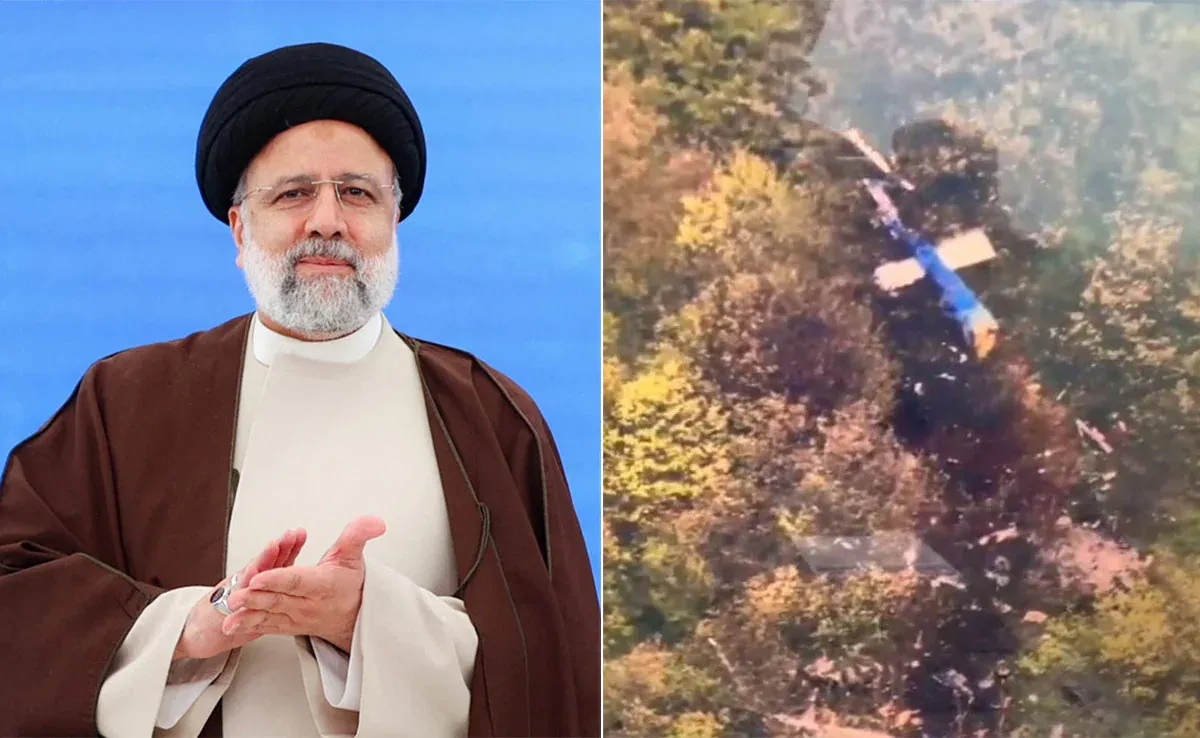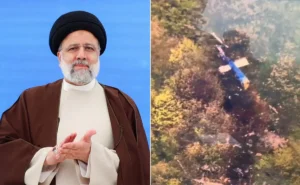Iran’s President Ebrahim Raisi has tragically died after a helicopter carrying him and other officials crashed in a mountainous and forested area of the country during poor weather conditions. The accident claimed the life of the 63-year-old leader, who had been serving as president for nearly three years and was anticipated to seek re-election next year.
No immediate cause was provided for the crash, which occurred amid foggy conditions on Sunday while the president was returning from a trip to neighboring Azerbaijan to inaugurate a dam. According to the state-run Irna news agency, the governor of Iran’s East Azerbaijan province, the representative of the Leader of the Islamic Revolution to East Azerbaijan province, and several bodyguards were also on board.
Live Updated
8:58 AM WAT 20TH, MAY, 2024: World leaders have extended their condolences to Iran following the tragic death of President Ebrahim Raisi in a helicopter crash yesterday. The crash occurred in a remote area near Iran’s border with Azerbaijan and also claimed the lives of Foreign Minister Hossein Amir-Abdollahian and other officials.
Recep Tayyip Erdoğan expressed Turkey’s solidarity with Iran during this challenging period, recalling Raisi’s efforts for peace in Iran and the region, stating, “As a colleague who personally witnessed his efforts for the peace of the Iranian people and our region during his time in power, I remember Mr. Raisi with respect and gratitude.”
China’s foreign ministry conveyed President Xi Jinping’s condolences, while Tass reported that Russian President Vladimir Putin sent a message to Iran expressing deepest condolences for the significant loss suffered by the people of the Islamic Republic of Iran due to the plane crash that claimed President Raisi’s life, along with other prominent statesmen.
Prior to this, Russian Foreign Minister Sergei Lavrov described Raisi as a “true, reliable friend” of Russia.
8:42 AM WAT 20TH, MAY, 2024: Turning attention away from Iran momentarily, Reuters states that Mohammed Al-Khulaifi, Qatar’s Minister of State at the Foreign Ministry, declared on Monday that there is no political inclination to pursue a ceasefire agreement as long as Israeli troops maintain a presence on the ground in Gaza.
8:29 AM WAT 20TH, MAY, 2024: #Lebanon has announced three days of national mourning for Iran’s president #Ebrahim #Raisi.
8:26 AM WAT 20TH, MAY, 2024: #Iranian state TV has released footages depicting the crash site of the helicopter that transported President Ebrahim #Raisi and his companions who were martyred.
#Iranian state TV has released images depicting the crash site of the helicopter that transported President Ebrahim #Raisi and his companions who were martyred. pic.twitter.com/Vc0Y2SueYm
— Tasnim News Agency (@Tasnimnews_EN) May 20, 2024
8:14 AM WAT 20TH, MAY, 2024: According to Reuters, an Israeli official informed the news agency that Israel was not connected to the helicopter crash resulting in the death of Iran’s President Ebrahim Raisi.
Israel typically refrains from official comments regarding its activities beyond its borders, which have recently involved airstrikes in Lebanon, Syria, and Iran.
In April, Iran carried out an unprecedented direct attack on Israel, reportedly authorized by Raisi. This action was purportedly in response to what Iran perceived as an Israeli strike on an Iranian diplomatic facility in Damascus on April 1, resulting in the death of a senior official from Iran’s Islamic Revolutionary Guards and eight other officers.
8:08 AM WAT 20TH, MAY, 2024: According to Reuters, Russian Foreign Minister Sergei Lavrov described Iran’s late President Ebrahim Raisi as a “true, reliable friend” of Russia. Lavrov emphasized that both Raisi and Iran’s Foreign Minister Hossein Amir-Abdollahian were known in Russia for their role in enhancing mutually beneficial Russian-Iranian cooperation and fostering a trusting partnership. Lavrov extended sincere condolences to the families, friends, and the Iranian people, stating that Russia stands with them in this difficult time.
8:00 AM WAT 20TH, MAY, 2024: In contrast to the European Council president’s expression of “sincere condolences” to Iran on the passing of Ebrahim Raisi [See 7.39 BST], Dutch far-right politician Geert Wilders took to social media this morning, expressing his hope for Iran to transition into a secular state once more. He advocated for freedom for the Iranian people, rejecting an oppressive and barbaric Islamic mullah regime.
“I hope #Iran will soon become a secular state again, with #freedom for the Iranian people and without an oppressive and barbaric Islamic mullah regime,” he said.
7:54 AM WAT 20TH, MAY, 2024: Hamas expressed gratitude to Iran’s President Ebrahim Raisi and Foreign Minister Hossein Amir-Abdollahian for their support in its conflict against Israel following their demise yesterday. The Group said:
These leaders supported the legitimate struggle of our people against the Zionist entity, provided valued support to the Palestinian resistance, and made tireless efforts in solidarity and support in all forums and fields for our people in the steadfast Gaza Strip. They also made significant political and diplomatic efforts to stop the Zionist aggression against our Palestinian people.
7:42 AM WAT 20TH, MAY, 2024: This morning, European Council President Charles Michel conveyed the EU’s heartfelt condolences for the loss of President Ebrahim Raisi, Foreign Minister Hossein Amir-Abdollahian, and other members of their delegation and crew in a helicopter accident. “Our thoughts are with the families,” he emphasized.
“The EU expresses its sincere condolences for the death of President Raisi and Foreign Minister Abdollahian, as well as other members of their delegation and crew in a helicopter accident. Our thoughts go to the families.”
7:36 AM WAT 20TH, MAY, 2024: Russia’s embassy in Tehran also offered condolences following the death of Iranian President Ebrahim Raisi. Notably, as president, Raisi facilitated the supply of arms to Russia for its invasion of Ukraine.
7:28 AM WAT 20TH, MAY, 2024: Mohammed bin Zayed Al Nahyan, the President of the UAE, expressed his country’s solidarity with Iran during what he called a “difficult time.” He extended condolences to the Iranian government and its people.
7:16 AM WAT 20TH, MAY, 2024: Vice President Mohammad Mokhber convened an emergency cabinet meeting following reports from state media that President Raisi died in a helicopter crash.
In a statement, the government expressed condolences to Supreme Leader Ali Khamenei and the Iranian nation, assuring that operations would continue “without disruption,” as reported by Press TV.
Ministers also honored the late president, acknowledging his “tireless efforts,” according to the Tasnim news agency.
Who is Mohammad Mokhber and what is his expected role following President Raisi’s death?
As Iran’s Vice President, Mohammad Mokhber is expected to assume the role of interim president and oversee the organization of a presidential election within 50 days following President Raisi’s death.
What are some key details about Mohammad Mokhber?
– Born on September 1, 1955, Mokhber is closely aligned with Supreme Leader Ali Khamenei and became first vice president in 2021 after Raisi’s election.
– In October, Mokhber was part of a delegation that visited Moscow and agreed to supply surface-to-surface missiles and drones to Russia.
– Mokhber previously led Setad, an investment fund linked to the supreme leader.
– The European Union sanctioned Mokhber in 2010 for alleged involvement in nuclear or ballistic missile activities, but removed him from the list in 2012. In 2013, the US Treasury Department sanctioned Setad and its associated companies.
– Setad was established by an order from Ayatollah Ruhollah Khomeini to manage properties abandoned after the 1979 Islamic Revolution and use the proceeds for charitable purposes.
7:06 AM WAT 20TH, MAY, 2024: Pakistan to Observe Day of Mourning for Iranian President Raisi After Fatal Helicopter Crash
Prime Minister of #Pakistan Shehbaz Sharif announced on social media that Pakistan will observe a day of mourning with the national flag flying at half-mast, in respect for #Iranian President Ebrahim #Raisi and his companions.
Iran’s Tasnim news agency has provided additional details about the helicopter crash, revealing that there were nine people on board.
Among the passengers were East Azerbaijan governor Malek Rahmati and Maj Gen Seyed Mehdi Mousavi, who headed the president’s security team. The crew included a pilot, co-pilot, and a technician.
“Iranian President Ebrahim Raisi Martyred in Helicopter Crash
#Iranian President Ebrahim #Raisi martyred in a helicopter crash in the Varzaqan region of East Azerbaijan province.
Raisi was accompanied by Ayatollah Mohammad Ali Al-Hashem, the Friday Imam of Tabriz, Foreign Minister Hossein Amirabdollahian, and East Azerbaijan Governor Malek Rahmati, who also martyred in the crash.
The Incident occurred after a ceremony marking the inauguration of the Qiz Qalasi Dam, attended by Azerbaijani President Ilham Aliyev.
Other victims included Maj. Gen. Seyed Mehdi Mousavi, head of the president’s security team, a member of the Ansar al-Mahdi Corps, the helicopter pilot and co-pilot, and a technician.
A former chief justice, Raisi was a prominent figure representing conservative and hardline factions in Iranian politics. He was considered a potential successor to the 85-year-old supreme leader, Ayatollah Ali Khamenei. Raisi was born in Mashhad, a religious hub for Shia Muslims in northeastern Iran. He received his religious education at the seminary in Qom, studying under notable scholars, including Khamenei.
Ebrahim Raisi became president of Iran in 2021 amid low voter turnout and the wide disqualification of reformist and moderate candidates. Despite these challenges, he seemed poised for re-election, having secured a firm footing in the political landscape.
Raisi, like other top Iranian officials, directed his harshest rhetoric towards Israel and the United States, along with their Western allies. Since the onset of the Gaza conflict in October, he frequently condemned Israel’s actions, labeling them as “genocide” and “massacres” against Palestinians, and called for international intervention. He also vowed revenge against Israel after its attack on Tehran’s consulate in Syria, which killed seven members of the Islamic Revolutionary Guard Corps (IRGC), including two generals.
In response to these incidents, Raisi welcomed Iran’s retaliatory actions, which involved launching hundreds of drones and missiles at Israel. Although most of these were intercepted by a coalition of Israeli allies, Iran claimed overall success in its operations.
Raisi was known for his hawkish stance on the 2015 nuclear deal, the Joint Comprehensive Plan of Action (JCPOA), which stalled after the US withdrawal in 2018. He supported the strategic policy of “resistance” and “resilience” championed by Supreme Leader Ayatollah Ali Khamenei, especially in the face of severe sanctions. A close ally of the IRGC, Raisi backed the “axis of resistance” across the region, including support for Syrian President Bashar al-Assad in his prolonged conflict against opposition forces.
What happens next?
Following the death of a sitting president, Article 131 of the Islamic Republic’s constitution stipulates that the first vice president, currently Mohammad Mokhber, assumes the role of acting president. This transition requires the confirmation of the supreme leader, who holds ultimate authority over all state matters in Iran.
A council, composed of the first vice president, the speaker of parliament, and the head of the judiciary, is tasked with organizing a new presidential election. This election must occur within a maximum of 50 days, as reported by Reuters.
Ebrahim Raisi, who was elected president in 2021, was expected to serve until 2025 under the regular election schedule. However, due to the constitutional requirements triggered by his untimely death, the presidential election is now anticipated to be held by early July.
This accelerated timeline ensures the continuity of leadership and adherence to the constitutional framework, maintaining stability during this unexpected transition period.

